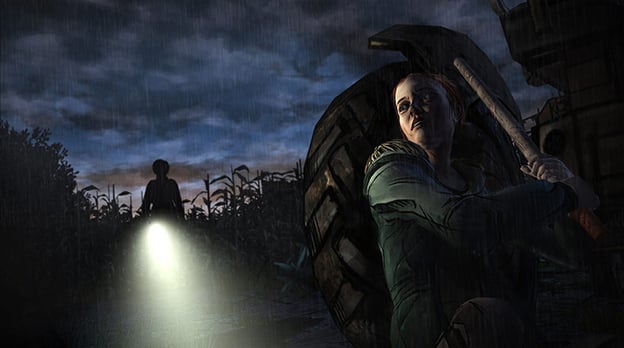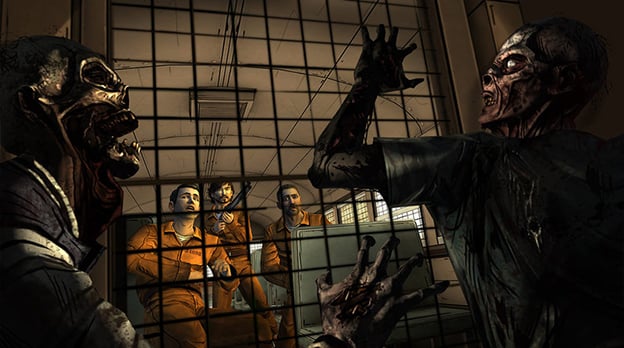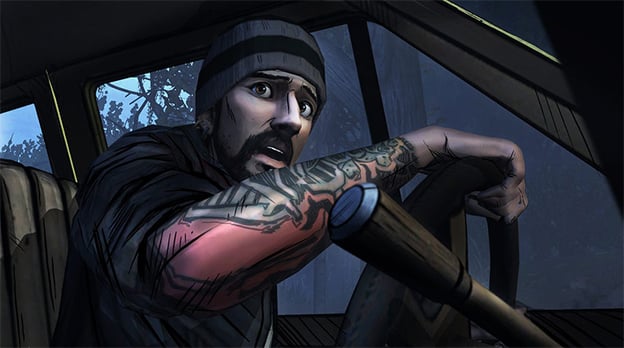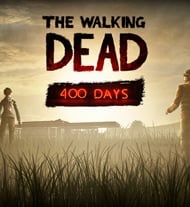400 Days of Short Stories
If The Walking Dead: Season 1 was the great American novel (zombie novel) in video game form, then The Walking Dead: 400 Days is classic, fictional short stories (zombie short stories) in video game form. Instead of connecting the player to a set of characters like Lee and Clementine, the game revolves around a setting instead: one little truck stop in Georgia. The events of 400 Days connect the player to the history of this truck stop and the world of Season 1 . Telltale will set the stage for Season 2 later this fall.
The game opens up on a bulletin board showing with pictures of several missing persons posted on it. These will be the characters you control during the game. You can play the stories in any order you like, and they take place anywhere from 2 to 400 days after the zombie apocalypse erupts. However, the stories are likely best experienced when you play them in order. Elements from previous chapters tend to show up in later chapters, referencing the events that took place, even though they may not have much relevance to the new characters you are controlling. Similarly, elements from Season 1 tend to show up as well, such as the drug store where you camped out in Episode 1.
The whole short-story format of 400 Days has its ups and downs. The game does a fantastic job of making you care about characters in a very short span of time. As always, important decisions need to be made without giving you a lot of time to think about them. So you are forced to come to your own conclusions about the backstories of some of the characters you meet. Believe it or not, this is a good thing. Allowing you to fill in the gaps in character motivation and backstory with your own imagination actually works quite well in this format.
The one downside to the format is that you always kind of want more. Granted, every character’s story is successfully wrapped up (to different extents), but it just doesn’t give you the same payoff as the Season 1 endings did. The game leaves you feeling like there is more story to tell, which is actually the case considering Season 2 is coming out, but that doesn’t change the fact that there is a little something about the game that feels… incomplete. Maybe that’s the whole point? Maybe Telltale is just getting us hyped for the next season? Who knows.

The most satisfying part of 400 Days is its variety of gameplay. 400 Days doesn’t play it safe by sticking to the formula that worked in Season 1 . Instead, it introduces a whole bunch of new gameplay elements such as stealth sections or contextual shooting sections. There are also several more quick-time events in 400 Days than there were in Season 1 , making the whole DLC chapter feel more urgent.
However, this urgent pacing also comes at a price. Some of the stories feel a bit odd, as short establishing scenes are cutoff to make way for more action-based scenes. Huge spans of time are lost in scene transitions as you hop, skip, and jump your way to important points in your characters’ lives. It’s not sloppy so much as it is jarring, breaking you out of dialogue that you were invested in. It’s easily overlooked and made up for by the overall quality of the rest of the plot, but it bears mentioning as a tiny flaw within the short-story video game format.

Another interesting quirk about 400 Days lies in its overall tone. It doesn’t really feel like Season 1 in that it’s not really telling the story of a man caught in the zombie apocalypse. Instead, it’s telling the story of the zombie apocalypse itself. You aren’t really given time to explore your surroundings like you were in Season 1 . Sure, there is plenty of the good-old Telltale “click on X to pick up Y and interact with Z”-style gameplay, but you rarely have those moments like you did in Season 1 where Lee was just wandering around the drug store or the motel. Instead, the game constantly forces you into climactic scenes after a short bit of character building, usually done through dialogue. Once again, this isn’t a bad thing; it’s just a facet of the new short-story format.
The two biggest questions that have to be answered when reviewing The Walking Dead: 400 Days are, is the story good, and do your choices matter? Story and choice were the big draws of the original Season 1 . As far as choices go, I can’t really say whether your choices matter that much. When the chapter is concluded, there was still a lot of vagueness surrounding what you did and how it made an impact on other characters’ lives. It’s also not entirely clear how these choices will play into Season 2’s beginning. Although, it’s also still unclear how much Season 2 and 400 Days are linked. At worst, the game is effectively lying to you enough to make it feel like your choices matter, and at best, the game is actually recording these choices for future gameplay.

As far as the quality of the story goes, yes, the story is good. It’s filled with the writing that made Season 1 amazing and then some. You are constantly forced to make moral decisions that make you cringe and doubt yourself as a human being. The skillful dropping of references to other parts of the game and other chapters in the DLC are masterful. Sometimes you’ll see a character in the background, wonder who he is, and then end up realizing he has a huge part in another story.
It’s so hard to talk about the story without spoiling any of it, but suffice it to say, this experiment in storytelling worked wonderfully. Watching the characters interact with each other at this one truck stop makes the setting come alive. You get to see how it dilapidates as the human race falls to the zombie menace. You get to see the impact you and others are having on the world around you and watch as schemes unfold and fall apart in mere minutes. The setting is the character in this story. If that isn’t enough to make the games-as-art crowd out there drool all over themselves, I don’t know what is.
Unfortunately, the game isn’t perfect as far as technical performance goes. I played the PC version and I came upon more than one bug. At one point the audio stuttered; at another point the lips didn’t synch-up quite right, and the controls didn’t respond at all for a split second during a very tense moment in the game. The loading times also aren’t the best, though they do give you a brief respite from an otherwise intensely emotional ride.
Now for the big question: Should you pick up 400 Days ? Yes! What are you, crazy!? This is a phenomenal new experiment in storytelling that redefines the types of stories that can be told in video games! Granted, there’s little reason to play this game if you didn’t pick up Season 1 … but if you didn’t pick up Season 1 , what’s wrong with you!? Pick up Season 1 , play through the story of Lee and Clementine, and then play this five-dollar horror anthology of moral ambiguity. It’s totally worth the price of admission.
RATING OUT OF 5 RATING DESCRIPTION 4.0 Graphics
I encountered a few graphical bugs, but otherwise the comic-book style graphics are still as great as ever. 4.2 Control
The controls utilize the same interface as Season 1 , though they are used in new and interesting ways. 4.0 Music / Sound FX / Voice Acting
The voice acting is still top notch. 4.5 Play Value
Anyone who got The Walking Dead: Season 1 should purchase this game. 4.3 Overall Rating – Great
Not an average. See Rating legend below for a final score breakdown.
| Review Rating Legend | |||
|---|---|---|---|
| 0.1 – 1.9 = Avoid | 2.5 – 2.9 = Average | 3.5 – 3.9 = Good | 4.5 – 4.9 = Must Buy |
| 2.0 – 2.4 = Poor | 3.0 – 3.4 = Fair | 4.0 – 4.4 = Great | 5.0 = The Best |
Game Features:
